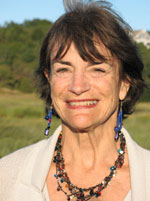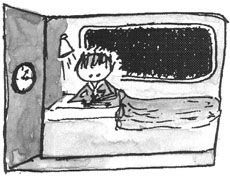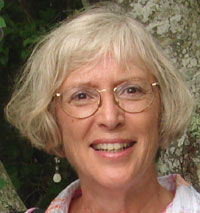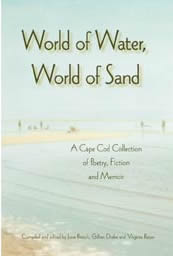personal essay
Spirit, You Know The Way
by Suzanne McConnell

I WROTE MYSELF A LETTER in 1960, when I was seventeen, to be opened ten years later.
I predicted "You'll probably still be living in San Diego, because I can't imagine you living anywhere else. You'll be married, have 2.5 children, and be vaguely unhappy."
I did not, of course, want that. But I didn't know what I wanted, had little self-confidence, a father tough on my self-esteem, and no real-life models other than teachers for anything else. The adults I knew were working class people like my parents. A generation upon whom the Depression had befallen, they had all come to Southern California from somewhere else for better jobs and lives. The women were mothers, a few of whom worked, but none had professions. Aspiring to something beyond motherhood was nearly taboo.
I was a senior in high school, living with my family on the outskirts of San Diego, and I knew that I would be commuting to San Diego State College the following year. Tuition would cost only $42 a semester. My parents couldn't afford to send me away, and my B+ average wasn't enough to get a scholarship. The only thing I had ever excelled in was writing, but writing itself was not a subject of study, and, in comparison to my brilliant older brother's straight-A performance, not particularly remarkable.
I'd had a boyfriend for a year, but in my senior year I kept breaking up with him. He was just a regular boy. I had wanted to "go steady" like all the other girls, with a ring dangling around my neck. It was during one of these periods when I had broken it off again with him, or perhaps started it up, when I was looking forward to living at home and attending San Diego State – although I ached to explore and experience the world, with an ache akin to spring fever, a fever I'd not yet known, since I had never experienced winter – that I wrote the letter to myself.
The next year, my freshman year, my life began to change radically.
I was startled by the real-life discoveries I was making in my sociology class, taught by the only black professor I'd ever had, or in fact, ever would have. I majored in sociology.
That spring I fell in love with a wild, troubled, gorgeous boy, a surfer, captivating enough to keep my attention for the next five years.
In the summer, I flew for the first time and lived in Denmark with an older cousin for four months. Then a high school friend and I borrowed money from our parents, bought two-month Eurail passes and Europe On $5 A Day, and traveled all over Europe.
I returned home to find my boyfriend in a prison for juveniles. With several counts of petty theft and drunk and disorderly already on his record, he had been given the maximum sentence for a final offense, assault. For a year, twice a month on Sundays, I rode up and back with his father to Los Angeles to visit him. Visitors had to be with a relative. He was released the following December, on my birthday.
Nine months later, in August, my parents sold our few acres for enough money to buy a 250-acre farm near Fayetteville, Arkansas, where my father was from. Since my relationship with my boyfriend was volatile, and I was unable to support myself because I was still repaying my father for my European trip, I moved with them and my sister—my brother had joined the Army—to Arkansas.
It was 1963. Kennedy was shot and killed that fall. The black students on our Fayetteville campus lived in separate dorms. The football team was not integrated. The drinking fountain at the University's medical school in Little Rock, as my sister and I discovered when we double-dated to a football game there, said "White Only," and the restroom "White Women Only."
My sociology classes were boring. In my theory class, I asked the only black student to be my partner on a team project. When he and I entered the library, all heads looked up. When we walked down the busy street to the house where my sister and I lived (the Yankee girls living by themselves off campus, tsk! tsk!), cars slowed, drivers stared, spat, yelled "Nigger!" and "Nigger-lover!" I was truly afraid, in Arkansas, for the first time in my life.
My heart was already on the left; my experience in Arkansas moved my body there and I joined Martin Luther King Jr.'s march from Selma to Montgomery.
That summer, my sister and I drove back to San Diego, rented an apartment, and searched for jobs. We finally found work as nurses' aides at a nursing home. I'd never seen people so helpless. I'd never seen such callousness as from the director who put profit and appearance as her priority, or such coldness as from the head nurse, or such a daily grind of care by the nurses' aids' staff, care restricted by time and money to the custodial.
I was thoroughly discontent with sociology by this time. Theories, statistics! What had they to do with visceral human suffering, with the institutions of prison, racism, and nursing homes in which I had been thoroughly immersed in the space of a few years, which maimed people in specific and terrible ways? With the escalating Vietnam War? With President Kennedy being shot? I was enraged, despairing, overwhelmed. These things were not what I had grown up knowing or expecting of the world.
My last semester of college, I took the courses I wanted to take, including creative writing.
The teacher, William Harrison, had come straight out of the University of Iowa's Writing Workshop. He told us we needn't worry about writing anything worthwhile; we wouldn't.
A story was due. I procrastinated. Then I began. Soon the only thing I wanted to do was to write it. I did not go to classes. I wrote my story. It took five days, and grew to thirty pages. There was a man in a nursing home, a young woman who worked there, and her able-bodied, troubled boyfriend. The man dies. The young woman is "an open sore of tenderness." She wanted "to take humanity by its shoulders and shake it fiercely and scream into its face: ‘See? See? Can't...you...see?’"
When I got the story back from my teacher, it was marked "A" with a respectful note: "Come see me anytime."
I made an appointment. I went to Bill Harrison's office in Old Main. He was so excited about my story, he paced. No one in all my life had ever been excited by something I'd done, let alone paced over it.
I walked out of his office split in half: my body felt divided exactly down the middle. I knew my life had just changed. I wanted someone to tell all this to, and tried, but it was impossible to explain. I walked home stunned. My left half seemed bowed in, was dark, sad, and mourned. The right side stepped out. It seemed to speak: "You always knew you could do it."
Bill Harrison told me there was a short story contest the next week. He said there probably wasn't enough time for me to revise my story for smoothness and consistency to turn it in by the deadline.
Three boys had invited me to the gala Cotton Bowl weekend in Texas. I stayed home, edited my story, handed it in by the deadline, and won first prize.
I consulted Bill Harrison again. This has changed my life, I told him. I detest sociology. What should I do now?
He said, ‘Well you could stay here in Arkansas, get an assistantship in the English Department, an MA in English, and keep writing. Or you could apply to the University of Iowa Writer's Workshop.’
I applied for the Workshop. I bought a Greyhound bus ticket with my $25 prize money, and with another girl, headed to New York City.
It was the worst summer of my life. I looked for editorial assistant jobs, discovered my B.A. was useless, and got down to a nickel. The director of the youth hostel where I stayed finally hired me part-time as a secretary. I thought I was pregnant (from a sudden rendezvous before leaving Arkansas with that same boyfriend I could neither part from nor abide). I did not receive notice from Iowa about whether I was accepted at the Writers’ Workshop. My father decided against paying tuition.
I felt lost in New York. I knew that without support, the sunburst of writing that story and winning first prize would not be enough to sustain me towards actually becoming a writer. I hadn't the knowledge, practice, or confidence to do that myself. By summer's end, I was desperate.
A guy staying in the hostel was hitchhiking to Chicago. I asked if I could hitch with him. I had $30, enough for bus fare from Chicago to Iowa City.
On the Greyhound bus from Chicago to Iowa City, a guy and his girlfriend with "U of I" on their sweatshirts sat in front of me. I told them my predicament. They suggested possibilities to live and look for jobs, and offered me a place to stay until I found one.
The next day I discovered I had been accepted at the Writers’ Workshop. I rented a room and found a waitressing job. At day's end, I called my father and asked if he'd loan me that semester's tuition. He said he would. That was 1965. I was twenty-three.
By my twenty-seventh birthday, I was living in Michigan, had my M.F.A. in Fiction Writing and a full-time job teaching composition, introduction to literature, and creative writing. But I had never forgotten the letter I had written to myself when I was seventeen. It was stored at my parents' farm. On the visit prior to my birthday, I retrieved it.
I did not think there would be any surprises when I opened it. "You'll probably still be living in San Diego, because I can't imagine you living anywhere else. You'll be married, have 2.5 children, and be vaguely unhappy," it would read. I remembered that, I remembered my mood.
There was that paper, from that cheap tablet. Yes. And there those words were. Yes.
Then I got to the last line. It said, "I think you should write.
Love, From Another Susan."
There she was, beside me, that seventeen-year-old who had never been anywhere but San Diego, never fallen in love, that naive virginal girl aching to explore life, who only knew what she did not want.
Or so it seemed.
That other Susan.
Twice nominated for Pushcart Prizes, Suzanne McConnell’s stories, poems and essays have appeared widely in journals and anthologies. She has an M.F.A. from the Iowa Writers’ Workshop, teaches at Hunter College in New York City, and is Fiction Editor for Bellevue Literary Review.
A story composed from her first novel won Second Prize in So To Speak’s 2008 fiction contest, and the novel, Fence of Earth, a finalist for the James Fellowship for Novel in Progress, is now available for publication. Her memoir about Kurt Vonnegut as a teacher at the Iowa Workshop is on-line at
http://fm.hunter.cuny.edu/english_dept
and a radio interview with her about Vonnegut is on a podcast at http://web.mac.com/garyshapiro
As a career counselor and business consultant, Beverly Ryle has been helping corporate professionals, business owners, and people-in-transition achieve their full potential for over 25 years. She was a regular contributor to CapeWomen magazine and has writen her first book, "Ground of Your Own Choosing," now at the publisher. Here she relates her process of bringing this creative project to fruition:
On Writing and Publishing
My First Book
by Beverly Ryle

LAST MONTH THE manuscript of my first book, Ground of Your Own Choosing, finally went to the publisher. You can’t imagine the relief I feel to be approaching the completion of this intense, time-devouring project.
Putting your voice in the world in whatever form your creativity takes - writing a book, designing a bridge, developing a branding strategy—is exquisite agony. And how long it takes!
My journey with writing began fifteen years ago in Bend, Oregon. I was attending a training with Richard Bolles, author of What Color is Your Parachute? He was leading us in a skills exercise, encouraging us to think outside the box, and at the time I thought I added the word “writing” to my list of skills simply because I had a pencil in my hand and it was a handy response. Today I would be more inclined to see it as divine intervention. Later, when I prioritized my list of skills, much to my surprise, writing ended up on top. I would have expected it rather to be public speaking or counseling which come much more naturally to me than writing.
After this experience I began to honor the act of writing in simple ways. I refinished my great-grandmother’s desk so I’d have a special place to compose letters to friends and family.
Occasionally I wrote poems and essays, some of which found their way into the newsletter published by our church.
Being a contributor led me to the idea of creating my own newsletter, which would force me to write regularly, and that’s what I have been doing for the last five years.
To make the leap from newsletter to book, at the beginning of 2007, I committed myself to using my column as a venue for book chapters, one a month for a year.
The Inside Story
That is the linear, external version. Inside me, as I worked through successive gauntlets of self-doubt, procrastination, and trying to figure just what it was I was trying to say, it was a lot messier.
The poems and essays were written on long weekends because I didn’t know how to give myself time to write, nor did I feel that my efforts were worth the investment. Writing was then a luxury which I could afford only after I’d cleared my to-do list, and unless I had a windfall of extra time, it didn’t happen.
Even after my newsletter was being distributed to eager readers, and I started receiving positive feedback, the idea of writing a book seemed totally unfeasible.
To offset my self-generated negativity, I found a writing teacher and mentor, and spent several years in dialogue with her. She would sing a melody of direction and encouragement, and I would answer in counterpoint with all the reasons why I couldn’t write more—a demanding professional schedule, elderly parents, children, grandchildren, community service commitments.
I’m tempted to say that “on paper” all of these excuses were real, but of course the issue was about not getting anything on paper. All of my justifications came down to my belief that I didn’t have the time, which I now know is just an excuse for not being ready to commit myself fully to the creative process.
On the Train
To celebrate my 60th birthday, I traveled to Chicago on the Lake Shore Limited to participate in a program on Transition in the Second Half of Life led by William Bridges, another of my valued teachers.
My decision to take a long train ride rather than a short flight was a last-ditch attempt to impose a business solution on a creative problem, i.e., the book. The train would give me an expanse of time in which I could force myself to churn out an outline and few chapters to get things rolling.
This sounded reasonable, but it didn’t work. I didn’t write anything that came together in a way that made sense to me, and I got very angry at myself for failing to achieve my goal.
In the middle of the night on my return trip, with nothing to show for my Amtrak writing “retreat” but a page of illegible scribbling (which incidentally later became a column), I learned what I’d really come for - the realization that even my best business disciplines were not going to drive a creative process.
My forced march was a total failure, but by wanting to write enough to at least try it, I was able to break through an invisible wall and accept operating at the precarious edge of my own growth instead of relying on my known strengths.
Thinking back, I realize that this was a wonderful example of a saying I’d heard recently: “Don’t worry about falling—just lean into it so that when you fall you fall forward.” Trying to mandate a solution to the book had caused me to stumble, but when I did I fell forward into a much better place.
After my experience on the train, the book became an internal rather than an external process. I stopped trying to get it done or figure out exactly where it was going. I’d spent months trying to come up with the perfect outline from which the book would “write itself,” but ultimately the outline which proved the most helpful was a list of phrases from a brainstorming session I’d had years earlier that I came across unexpectedly in a moment of frustration.
And Now That It’s Almost Over
Although I can’t say I have enjoyed my editor’s insistence that I rework several chapters, or the seemingly endless revisions, I am beginning to see the value of being open to the synergy that comes from revisiting, reshaping, and refining with others what you thought was finished. This is something my “get it done” businesslike self (my MBTI® code ends with a very clear “J”) finds very difficult to do.
By allowing the work itself to teach me how to do it, I gained something far better than the false security I had tried to create with file folders full of outlines and notes.
When in the despair of a blank period I would rummage through these notes. They were usually strewn all over the place because I no longer had the delusion that organizing my external space would be mirrored internally. I found a comment or a snippet of information written years earlier, which was still right on the mark, and it always came by accident.
The affirmation of seeing the core message of the book slowly materializing out the rubble of five years of false starts was more comforting than any master plan I could have come up with.
A creative project requires a combination of discipline and looseness. In my fear-based attempts to build a rock-solid structure to support my writing, I had left no space for surprise, no room for the magic of pieces of the story coming together in unexpected ways.
By trying to orchestrate how it would happen, I took the energy and excitement which would invigorate and sustain my efforts out of the equation. Yet, without the discipline of establishing a regular writing time, and a commitment to being productive, my efforts would not have gone much beyond wishful thinking.
Trying to strike a balance on the tightrope between will and creativity is ultimately an act of trust, not just that the project will somehow get done, but that by staying in the process you will become who you need to be to complete it.
Drawing by Eloise Morley

As a career counselor and business consultant, Beverly Ryle has been helping corporate professionals, business owners, and people-in-transition achieve their full potential for over 25 years. She was a regular contributor to CapeWomen magazine and has writen her first book, "Ground of Your Own Choosing," now at the publisher. She relates her process of bringing this creative project to fruition on the Women and Words page. She lives in North Eastham where she runs the Center for Career and Business Development, PO Box 156, North Eastham, Cape Cod, MA 02651 Tel: 508.240.3532
www.successonyourownterms.com
Marking the passage of time
Five Years Later
by Virginia Reiser
I COULD FIND OUT exactly how many tides have rolled in an out over the past five years, but I’ve decided that’s not important. One of the luxuries of being older is discovering that wisdom lies not so much in pinpointing facts, but in exploring feelings.
And so, tides run high or low. At times, they nip at our heels with their fullness. At others, they tantalize us with silver edges, glittering diamonds into the sun so far away, they seem almost impossible to reach. One day, the waves crash with such force that destruction and loss are as inevitable as the tide itself. And yet, with the next tide, the sea flattens into reflective smooth ribbons promising journeys never before undertaken or understood. The choice of how we view the tides of our own lives, our own filter, is what makes our journey either one of resignation or one of wonder and discovery. Even at sixty. Or, now that I dare to write it here, even at sixty-one.
I have been ill again, not once, but twice, and still learn every day how to co-exist with a life-threatening disease. I have had friends die and parents lose memory as they slip into a hole only time can define. But I have also learned the power and joy, the great gift that is remembrance. As I have learned how the knowledge of remembrance holds the promise of life for those who are seriously ill or dying, I have become less afraid to help. And I have asked for remembrance not only of myself for others, but of others for myself.
I have learned to forgive, not only others, but myself. I have weighed what matters in the end against what seems important at the moment and understood the difference.
Most of all, I have followed the lure of early dreams. I have learned the importance of constant pursuit, the need for creativity, the foundation art provides, the shelter it becomes, the truth it engenders. I have studied long and hard for a new degree, a master of fine arts in creative writing. I have written and rewritten, rewritten and written again. Until finally I have learned to tell more of my own truth in my fiction. And I have learned, too, the necessity of determination, especially as I wrote to fulfill my own childhood dream of becoming a novelist.
Now I have written my first novel, Absolution, the first draft completed only weeks ago, and have begun to set it on its own journey. The pages of my next novel are already turning, turning in my mind, building their own tide. And whether full or far, I am running eagerly to catch all its whispers.
I have understood that my two rules for writing; 1. Pay attention, 2. Connect, provide a simple, underlying basis for life. That most of us seek only to be understood, heard, appreciated, and that perhaps these three verbs encompass what it means to love and be loved.
I have learned the importance of joy and celebration, whether in the comfort of a family member’s beloved hand, the raising of a champagne glass to the rising of the full moon, or the deep listening only a friend can provide. Life, I have sensed, is about the effort we continue to make, the intention we try to hold. Success may be intermittent at times, but if the effort prevails, we prevail.
And so the amount of my tides do not count as much as where they have brought me—not only to this place here on earth, this semi-island hounded, bounded, but always embraced on every side by its sea, but to this place in my life. There is sorrow, but deep contentment. There is loss, but not despair. There may not be many years left, but there will always be something new to learn. To explore. To dream. To live.
Virginia Reiser has been an magazine and book editor, a chef, and owner of a catering business. To fulfill a childhood dream she began taking fiction classes ten years ago. Recently, she completed an MFA degree in fiction at Vermont College. Currently, she is a freelance editor and writer. Just a few months ago, she finished her first novel, "Absolution."
. . . . . . . . . . . . . . . . . . . . . . . . . . . . . .
Fall Classes offered by First Light of Cape Cod
Stop Talking About Writing A Book ~ Just Write It!
This class is for anyone dreaming of writing the book that has been rattling around in their head for years. It is also for fiction and non-fiction writers struggling to complete a manuscript-in-progress. Share your journey with comrades who understand the challenges of writing in isolation. Through this class you will enjoy weekly support and a gentle yet constructive critique of your work. You will also learn how to edit your work and create a clean, professional manuscript. The main focus, however, is to simply keep you writing!
Becoming “Powerful Beyond Measure”
When Marianne Williamson wrote “Our deepest fear is not that we are inadequate. Our deepest fear is that we are powerful beyond measure…” she was challenging us to face our true potential in life. This class extends her challenge to you, by leading you on an exclusive journey of personal discovery. The focus of this class is to teach you how to harness the power of intention and reclaim your creative energy by building a vision map of the future you hope to create for yourself.
Discovering The Artist’s Way
Based on the best-selling book by Julia Cameron, this class is not only for the artistically inclined, but for anyone who would like to explore their creativity and develop a deeper sense of spirituality. It is also for any creative soul stuck in the quagmire of the “creative block.” Through reading and discussing the weekly chapters in a safe, supportive setting, we will gently explore personal issues that may have held us back, while also discovering new, creative ways to heal old wounds. This 12-week process will lead you toward personal empowerment and a profound sense of freedom. The Artist’s Way will teach you how to open yourself up to authentic creative expression.
For times and reservations, please contact Nicola Burnell at firstlight@capecod.net
. . . . . . . . . . . . . . . . . . . . . . . . . . . . .
To order, check your local Cape Cod bookstore, or email: GillianHDrake@aol.com
$14.95 plus $5 shipping.
The following poem is from the anthology of poetry, fiction and memoir about Cape Cod entitled "World of Water, World of Sand," published by Shank Painter Publishing.

There Comes a Time
by Mary Doering
when you are startled awake
by chance or accident
find your mouth forced open
by your own voice
see all the useless things
you stuff under your skin
to puff yourself up and realize
in the spin of years and habits
you have made only the
smallest make-shift hut
for your deepest longings
then is the time to take off the dress
with the forty small satin covered
buttons down the back
and dance naked
or sit in perfect silence
go out and become ink stained
tear stained or moon stained
until you can finally turn
your face into the wind and
sing your one true call note
into the vivid air
—Mary Doering
Mary Doering is a poet, photographer and artist. In 2000 she was awarded first place in CapeWomen magazine’s poetry contest. Mary lives in Orleans where her studio overlooks her flower and meditation gardens, inspiring both her art and writing.

photograph by Katie O'Sullivan
Return to top of page





